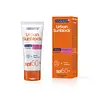What's inside
What's inside
 Key Ingredients
Key Ingredients

 Benefits
Benefits

 Concerns
Concerns

 Ingredients Side-by-side
Ingredients Side-by-side

Water
Skin ConditioningDicaprylyl Carbonate
EmollientCI 52015
Methylene Bis-Benzotriazolyl Tetramethylbutylphenol
UV FilterEthylhexyl Triazone
UV AbsorberButyl Methoxydibenzoylmethane
UV AbsorberDiisopropyl Sebacate
EmollientPropylene Glycol Dicaprylate/Dicaprate
EmollientSilica
AbrasiveC12-15 Alkyl Benzoate
AntimicrobialBis-Ethylhexyloxyphenol Methoxyphenyl Triazine
Skin ConditioningTriacontanyl Pvp
HumectantGlycerin
HumectantC20-22 Alkyl Phosphate
EmulsifyingC20-22 Alcohols
Emulsion StabilisingDecylene Glycol
Skin ConditioningGlucose
HumectantXanthan Gum
EmulsifyingSodium Coco-Glucoside Tartrate
CleansingCoconut Alcohol
EmollientHydrogenated Polydecene
EmollientTocopheryl Acetate
AntioxidantO-Cymen-5-Ol
AntimicrobialTrehalose
HumectantPropylene Glycol
HumectantSodium Hydroxide
BufferingCitric Acid
BufferingAscorbyl Tetraisopalmitate
AntioxidantTocopherol
AntioxidantSpirulina Platensis Extract
Skin ProtectingPolyquaternium-51
Skin ConditioningWater, Dicaprylyl Carbonate, CI 52015, Methylene Bis-Benzotriazolyl Tetramethylbutylphenol, Ethylhexyl Triazone, Butyl Methoxydibenzoylmethane, Diisopropyl Sebacate, Propylene Glycol Dicaprylate/Dicaprate, Silica, C12-15 Alkyl Benzoate, Bis-Ethylhexyloxyphenol Methoxyphenyl Triazine, Triacontanyl Pvp, Glycerin, C20-22 Alkyl Phosphate, C20-22 Alcohols, Decylene Glycol, Glucose, Xanthan Gum, Sodium Coco-Glucoside Tartrate, Coconut Alcohol, Hydrogenated Polydecene, Tocopheryl Acetate, O-Cymen-5-Ol, Trehalose, Propylene Glycol, Sodium Hydroxide, Citric Acid, Ascorbyl Tetraisopalmitate, Tocopherol, Spirulina Platensis Extract, Polyquaternium-51
Ethylhexyl Methoxycinnamate
UV AbsorberButyl Methoxydibenzoylmethane
UV AbsorberMethylene Bis-Benzotriazolyl Tetramethylbutylphenol
UV FilterCetearyl Alcohol
EmollientEthylhexyl Salicylate
UV AbsorberBenzophenone-3
UV AbsorberGlyceryl Stearate Se
EmulsifyingCoco-Caprylate
EmollientPropylene Glycol
HumectantCeteareth-20
CleansingDimethicone
EmollientXanthan Gum
EmulsifyingCyclopentasiloxane
EmollientEthylhexylglycerin
Skin ConditioningPhenoxyethanol
PreservativeTriethanolamine
BufferingDecyl Glucoside
CleansingAloe Barbadensis Leaf Extract
EmollientHydrolyzed Caesalpinia Spinosa Gum
AbsorbentCeteth-10 Phosphate
CleansingCaesalpinia Spinosa Gum
Skin ConditioningCyclohexasiloxane
EmollientGlycerin
HumectantDicetyl Phosphate
EmulsifyingBenzyl Alcohol
PerfumingEthylhexyl Methoxycinnamate, Butyl Methoxydibenzoylmethane, Methylene Bis-Benzotriazolyl Tetramethylbutylphenol, Cetearyl Alcohol, Ethylhexyl Salicylate, Benzophenone-3, Glyceryl Stearate Se, Coco-Caprylate, Propylene Glycol, Ceteareth-20, Dimethicone, Xanthan Gum, Cyclopentasiloxane, Ethylhexylglycerin, Phenoxyethanol, Triethanolamine, Decyl Glucoside, Aloe Barbadensis Leaf Extract, Hydrolyzed Caesalpinia Spinosa Gum, Ceteth-10 Phosphate, Caesalpinia Spinosa Gum, Cyclohexasiloxane, Glycerin, Dicetyl Phosphate, Benzyl Alcohol
Ingredients Explained
These ingredients are found in both products.
Ingredients higher up in an ingredient list are typically present in a larger amount.
Also known as Avobenzone, this ingredient is a chemical sunscreen filter that provides protection in the UV-A range.
Avobenzone is globally approved and is the most commonly used UV-A filter in the world.
Studies have found that avobenzone becomes ineffective when exposed to UV light (it is not photostable; meaning that it breaks down in sunlight). Because of this, formulations that include avobenzone will usually contain stabilizers such as octocrylene.
However, some modern formulations (looking at you, EU!) are able to stabilize avobenzone by coating the molecules.
Avobenzone does not protect against the UV-B range, so it's important to check that the sunscreen you're using contains other UV filters that do!
The highest concentration of avobenzone permitted is 3% in the US, and 5% in the EU.
Learn more about Butyl MethoxydibenzoylmethaneGlycerin is already naturally found in your skin. It helps moisturize and protect your skin.
A study from 2016 found glycerin to be more effective as a humectant than AHAs and hyaluronic acid.
As a humectant, it helps the skin stay hydrated by pulling moisture to your skin. The low molecular weight of glycerin allows it to pull moisture into the deeper layers of your skin.
Hydrated skin improves your skin barrier; Your skin barrier helps protect against irritants and bacteria.
Glycerin has also been found to have antimicrobial and antiviral properties. Due to these properties, glycerin is often used in wound and burn treatments.
In cosmetics, glycerin is usually derived from plants such as soybean or palm. However, it can also be sourced from animals, such as tallow or animal fat.
This ingredient is organic, colorless, odorless, and non-toxic.
Glycerin is the name for this ingredient in American English. British English uses Glycerol/Glycerine.
Learn more about GlycerinMethylene Bis-Benzotriazolyl Tetramethylbutylphenol (Tinosorb M) is a hybrid and broad-spectrum UV ingredient. It is both a UV absorber and filter.
UV absorbers are an agent that absorbs UV rays. They protect your skin by using chemical reactions to convert UV rays into heat and energy. UV filters physically reduce the amount of UV rays from reaching your skin.
Tinosorb M covers a range of 280-400 nm and is photostable. This ingredient is neither oil or water soluble.
Tinosorb M is not available in the US. However, it is available in the EU and Asia.
It's sister, Tinosorb S, is set to be approved in the US by late 2025 (fingers crossed!).
Learn more about Methylene Bis-Benzotriazolyl TetramethylbutylphenolPropylene Glycol is an odorless, colorless liquid. As a humectant, it helps skin retain moisture. It also aids in delivering active ingredients.
Another role of this ingredient is preventing a product from melting or freezing. Propylene glycol also adds antimicrobrial properties to a product, elongating product lifespan.
This ingredient is considered an organic alcohol and commonly added into both cosmetics and foods.
Those with sensitive skin or conditions may develop a rash when using this ingredient.
Learn more about Propylene GlycolXanthan gum is used as a stabilizer and thickener within cosmetic products. It helps give products a sticky, thick feeling - preventing them from being too runny.
On the technical side of things, xanthan gum is a polysaccharide - a combination consisting of multiple sugar molecules bonded together.
Xanthan gum is a pretty common and great ingredient. It is a natural, non-toxic, non-irritating ingredient that is also commonly used in food products.
Learn more about Xanthan Gum